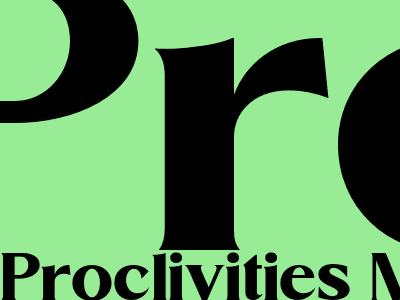
Proclivities: An Exploration of Inherent Tendencies
Understanding the Profound Influence of Inborn Propensities
Proclivities, deeply ingrained within our being, are inherent tendencies that shape our thoughts, actions, and behaviors. These predispositions, often biological or developmental in nature, exert a profound influence on our lives, influencing our choices, preferences, and overall trajectory.
The Nature of Proclivities
Proclivities encompass a broad spectrum of traits, from personality characteristics and cognitive abilities to physical predilections. They may manifest as preferences for specific activities, such as athleticism or artistic pursuits, or as behavioral tendencies, such as introversion or extroversion. Some proclivities are genetically determined, passed down through generations, while others are acquired through environmental influences, such as upbringing and life experiences.
Genetic Influences
Genetic factors play a significant role in shaping our proclivities. Studies have shown strong heritability estimates for traits such as intelligence, personality, and risk-taking behavior. Certain genetic variations have been linked to specific proclivities, suggesting a biological basis for our inherent tendencies.
Environmental Influences
Environmental factors also contribute to the development of proclivities. Early childhood experiences, parenting styles, and cultural norms can all shape our behavioral tendencies. For example, children raised in supportive and nurturing environments are more likely to develop prosocial behaviors, while those exposed to adverse experiences may exhibit increased aggression or anxiety.
The Impact of Proclivities
Proclivities have a profound impact on our lives, influencing our:
- Choices and Decisions: Our proclivities guide our choices, from our career paths to our romantic partners. They determine the activities we engage in and the people we associate with.
- Behavior and Patterns: Proclivities shape our behavioral patterns, influencing how we react to situations and interact with others. They can contribute to both positive and negative behaviors, such as resilience or impulsivity.
- Overall Well-being: Proclivities can influence our overall well-being, affecting our happiness, self-esteem, and mental health. Certain proclivities, such as optimism or neuroticism, are associated with better or worse life outcomes.
Cultivating and Managing Proclivities
While proclivities are deeply rooted, they are not immutable. With awareness and effort, we can cultivate and manage our inherent tendencies to maximize their benefits and mitigate potential risks.
Recognizing Your Proclivities
The first step in managing proclivities is recognizing their presence. Self-reflection, personality assessments, and feedback from others can help you identify your strengths and weaknesses. Understanding your proclivities allows you to make informed choices and develop strategies for cultivating desired traits.
Developing Strengths
Once you have identified your strengths, focus on developing them further. Engage in activities that align with your proclivities and seek opportunities to challenge yourself and grow. By cultivating your strengths, you can enhance your skills, boost your confidence, and achieve greater success.
Managing Weaknesses
Recognizing and managing your weaknesses is equally important. Identify areas where your proclivities may be hindering your progress or causing distress. Develop strategies to mitigate their negative effects, such as seeking support, practicing mindfulness, or engaging in cognitive-behavioral therapy.
Conclusion
Proclivities are inherent tendencies that exert a profound influence on our lives. By understanding the nature of proclivities, recognizing their impact, and cultivating and managing them effectively, we can harness our strengths, mitigate our weaknesses, and live more fulfilling and meaningful lives.